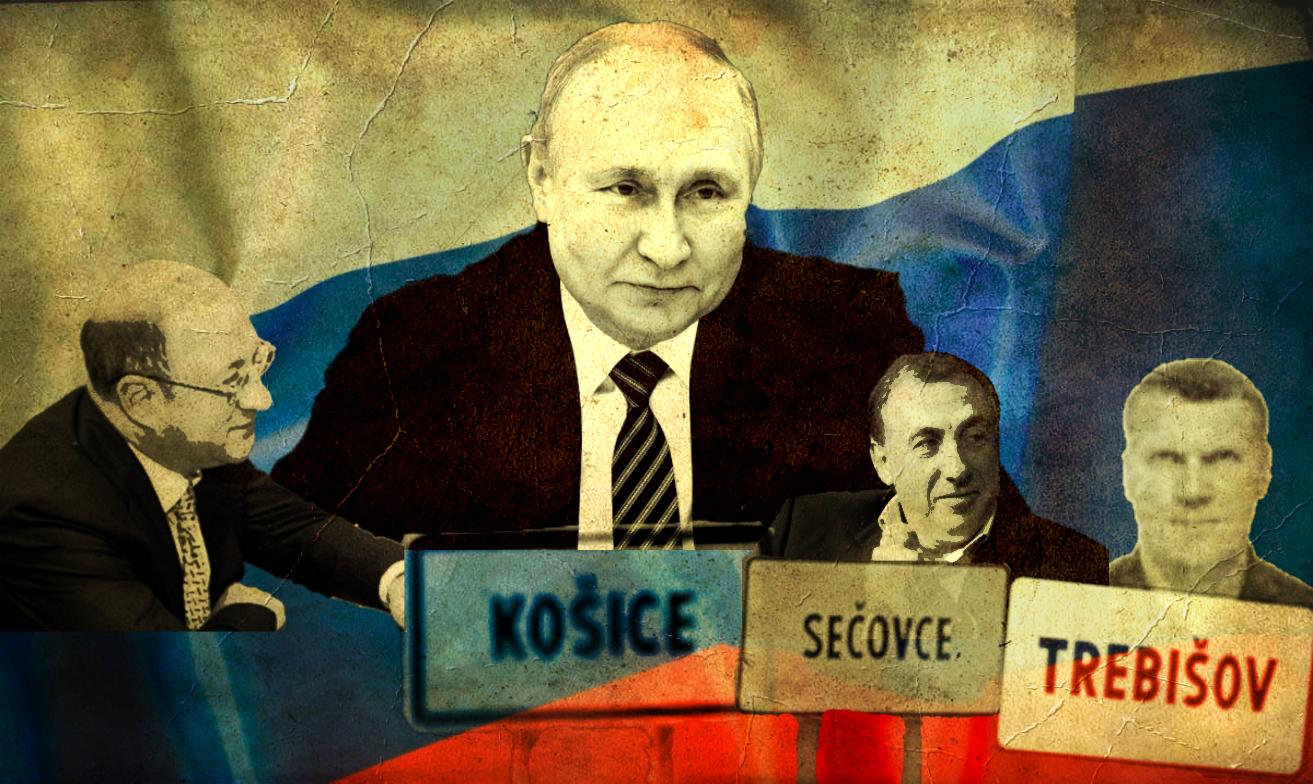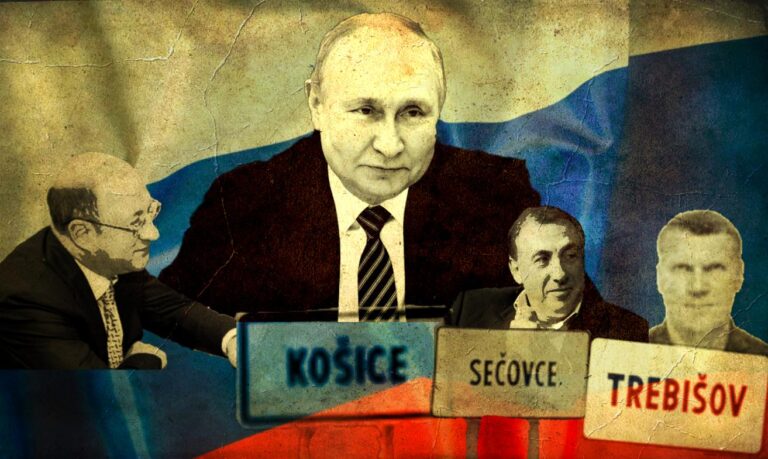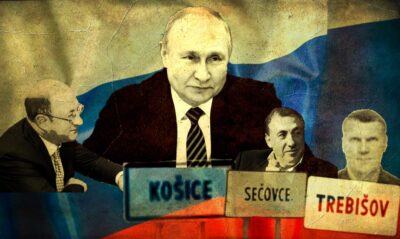by Karin Kőváry Sólymos, Lukáš Diko, Schemes/RFE/RL Ukraine, OCCRP ID
Member of the Russian Duma Alexander Babakov, president of the CSKA Moscow football club Yevgeni Giner, and Russian businessman Mikhail Voyevodin are the most prominent members of what is referred to as the Luzhniki group, which in the 1990s gained control of Luzhinki marketplace and stadium in Moscow. According to Schemes, an investigative program of Radio Free Europe/Radio Liberty’s (RFE/RL) Ukrainian Service, they have close ties to Putin’s Kremlin and still control strategic energy concerns in Ukraine.
Moreover, several years ago they were allegedly involved in arranging a Russian loan for Marine Le Pen’s political party. Since 2014, Babakov has been sanctioned by the US and other countries for voting in favor of annexing Crimea. CSKA Moscow is also on the US’s sanctions list. The Investigative Centre of Ján Kuciák has discovered that this group has conducted business activities in Slovakia for many years and that its members have profited from state money. Two of these Russians have connections to the same address in the town of Trebišov, and one is even a Slovak citizen.
The Slovak version of this article was originally published on icjk.sk
The Slovak trail of these Russian businessmen reaches back 20 years. At that time, they acquired Ukrainian energy distribution enterprises through privatization only thanks to collaboration with East Slovak Energy (VSE), then still a state-controlled company. VSE provided its name and know-how, but after the privatization process was completed, it withdrew from the Ukrainian businesses. After a series of transactions, these Ukrainian power suppliers ended up in the hands of VS Energy, a company associated with the Luzhinki group.
It was approximately at this time that two Russian businessmen and their wives registered the same address in the Slovak town of Trebišov as their permanent residence. Thus, an inconspicuous house was the official home of Alexander Babakov, Mikhail Vojevodin, and their spouses. In 2003, Voyevodin, his wife, and Babakov’s wife became citizens of Slovakia. The reason? They supposedly made great contributions to the Slovak Republic.
The early 21st century marked the beginning of their business activities in eastern Slovakia. A company that Alexandr Babakov was involved in until 2007 purchased from the city of Košice a neglected building in the center. Mikhail Voyevodin is still active in several Slovak companies today. He is the co-owner of several solar power plants that generate millions of euros thanks to state subsidies.
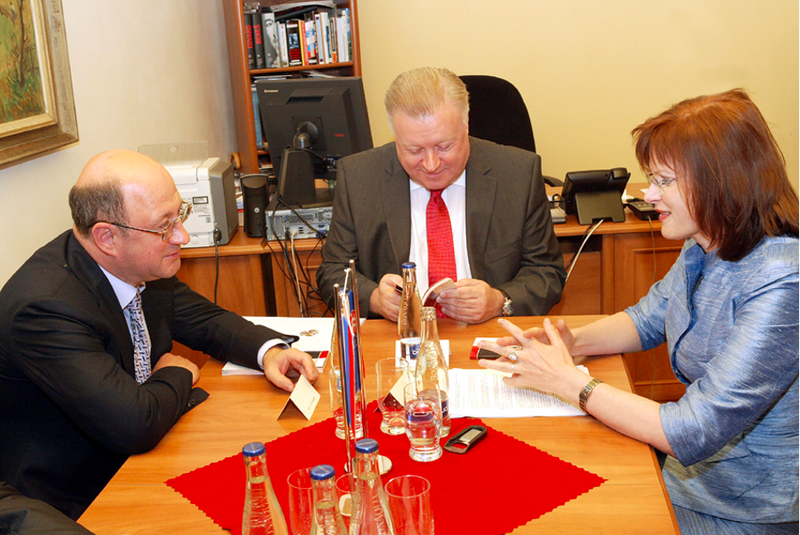
These Russian businessmen are also involved in a Sečovce-based company that manufactures fertilizer and has regularly received subsidies and diplomatic support from the Ministry of Foreign Affairs. Today only Voyevodin’s wife, Natalia Selivanova, plays an active role in the company, but it still has millions of euros in loans from shell corporations based in tax havens. We managed to confirm that these Russian businessmen from the Luzhinki group or their family members are behind these companies, too. Other companies in which a trio of east Slovak businessmen consisting of Štefan Szöke, Róbert Vysoký, and Jaroslav Kocák are involved have received similar loans valued in the hundreds of thousands of euros. Two of these Slovaks are also active in a company linked to Alexander Babakov.
We approached these three Slovak entrepreneurs with multiple questions. The only one to respond was Jaroslav Kocák: “As a part of my business activities, I am familiar with all of them except Mr. Giner. I met Babakov back in the 1990s, when I was working at a plant in the Mykolaiv Oblast. His cousin was the factory director. When Alexander entered politics, he fully abandoned his business activities. I have no personal connections to these people.”
We asked him to help us get in touch with his Russian business partners, but he did not. He also did not respond when we asked him how they managed to gain Slovak citizenship. We were unable to get statements from Alexander Babakov, Yevgeni Giner, Mikhail Voyevodin, or any of their family members, even though we contacted them at their official addresses in Slovak and abroad.
Luzhinki strongmen
Former deputy chairman of the State Duma and current member Alexander Babakov is considered to be a close associate and confidant of President Vladimir Putin. In 2012, Putin appointed him presidential envoy for Russian organizations abroad. According to the Kyiv Post, he is “one of Putin’s most important foot soldiers.” He is currently subject to sanctions imposed by Ukraine, the EU, and the US. He has been under EU sanctions since 2014 because he voted for Russia’s illegal annexation of the Crimea, Ukrainian territory. In 2018 Ukraine imposed unlimited sanctions on him. In April 2022, the US Department of Justice charged him with conspiracy to influence US politics to advance Russian interests.
In the past, Babakov’s name has also appeared in the Panama Papers. According to the OCCRP, he was one of several Russian “offshore patriots.” From April 2007 to September 2012, as a member of the State Duma, he owned 100 percent of shares in AED International Ltd., an offshore company registered in the British Virgin Islands.
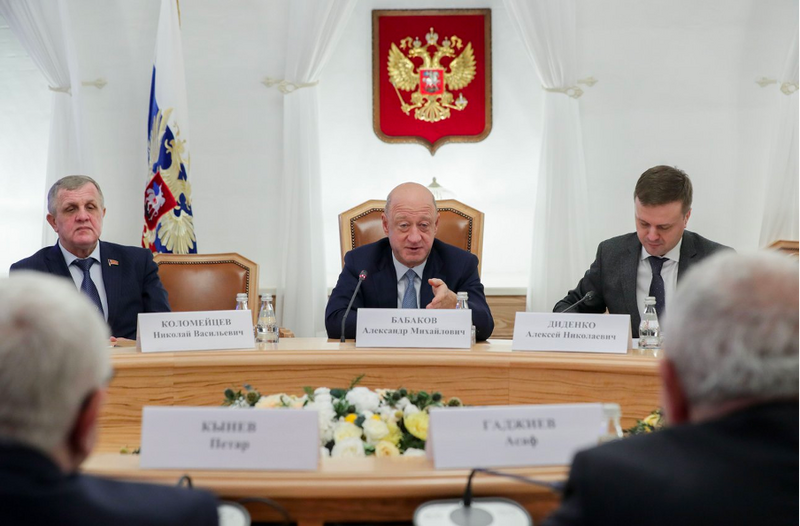
Alexander Babakov (center). Source: duma.gov.ru
According to Interpol documents gained by Ukrainian investigative journalists from the Schemes program, Mikhail Voyevodin, the second member of this group, is a so-called thief in law. Interpol issued a green notice for Voyevodin; such notices are meant to “provide a warning about a person’s criminal activities, where the person is considered to be a possible threat to public safety.” According to Interpol, he is a member of an organized crime group that engages in blackmail and money laundering in Russia and abroad.
In addition, according to information obtained by RFE/RL’s Ukrainian Service, Europol documents indicate that Swiss law enforcement authorities investigated Voyevodin for money laundering back in 2000. “An organized crime group from Eastern Europe that includes Alexander Babakov” is also mentioned in the Europol document.
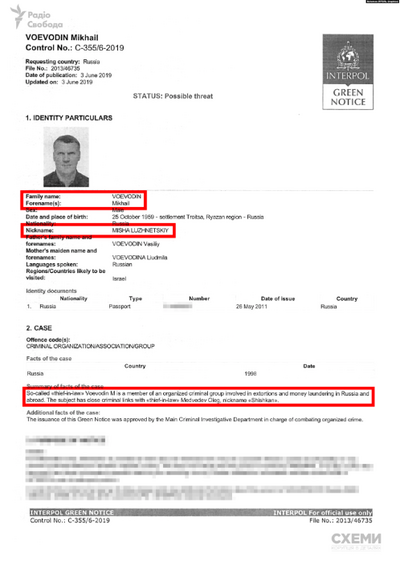
Source: Schemes
The final member of this trio is Yevgeni Giner, the president of the CSKA Moscow football club. In February, shortly before the Russian invasion of Ukraine, the US imposed sanctions on this team. Giner is also a partner in Rostech, a Russian state corporation that produces and exports high-tech industrial products for civil and military uses. Its CEO is former FSB officer Sergey Chemezov, an old friend and ally of Putin.
Business in Ukraine
Babakov, Giner, and Voyevodin unofficially figure as the ultimate beneficial owners of five regional energy companies in Ukraine (known as oblenegos): Khersonoblenergo, Kirovogradoblenergo, Zhytomyroblenergo, Rivneoblenergo, and Chernivtsioblenergo. These companies in the critical infrastructure sector provide electricity to millions of Ukrainian households.
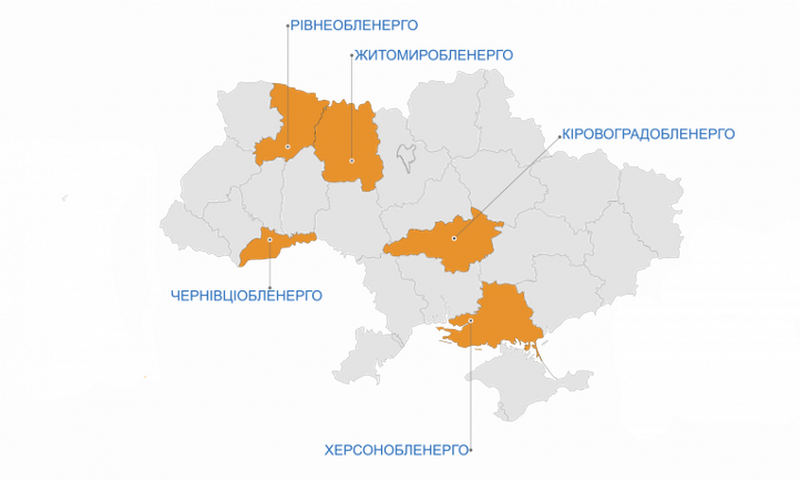
Source: VS Energy Ukraine
These regional companies are daughter companies of VS Energy International Ukraine LLC. The official ultimate beneficial owners are German citizen Marina Yaroslavskaya, Yevgeni Giner’s alleged wife, and Latvian citizen Valts Wigants, who is considered to be a close associate of Alexander Babakov.
According to Schemes, the Kremlin-connected Babakov, Giner, and Voyevodin also have control over the Dneprospetsstal steel plant in Zaporizhzhia, as well as Premier Hotels and Resorts, an accommodation chain with locations throughout Ukraine, including the five-star Premier Palace in Kiev and Premier Hotel in Odessa. According to Youcontrol, some hotels and a controlling stake in the steel plant are registered to Natalia Selivanova, the wife of Mikhail Voyevodin.

Natalia Selivanova, the ultimate beneficial owner of Dneprospetsstal. Source: Youcontrol
These findings indicate that the real owners of these Ukrainian businesses are Babakov, Giner, and Voyevodin, who are currently being investigated by Ukrainian law enforcement officials. The Ukrainian National Bureau of Investigation is looking into several cases of fraud and violations of the Ukrainian constitution committed by the Luzhniki group on behalf of VS Energy Ukraine. According to the investigators, this group is headed by Alexander Babakov, Yevgeni Giner, and Mikhail Voyevodin.
“A group of citizens of the Russian Federation, with close ties to the leaders of this aggressor country, have acquired critical infrastructure assets and other commercial facilities in Ukraine by committing certain transactions and machinations. We are investigating all related circumstances. Currently, preliminary hearings are underway based on five sections of the Criminal Code of Ukraine,” stated for RFE/RL prosecutor Roman Tulin from the Ukrainian Prosecutor General’s Office.
East Slovak Energy (VSE), then still a state-controlled company, was involved in the privatization of Ukrainian power enterprises by this group of Russian businessmen 20 years ago. VSE became involved in the privatization process not for itself but on behalf of its partners, who wanted to keep their names a secret. VSE management claimed that the investments would be made, and risks borne, by their partners. In the end, it came to light that their partner was the Ukrainian Energy Partners I fund, registered in the US. As the majority owner of four power supply enterprises in Ukraine, it eventually transferred its controlling stakes in them to a VSE subsidiary in the Netherlands, the already-mentioned VS Energy, behind which were the Russian businessmen from the Luzhniki group. In 2001, the CEO of VSE at the time of the transaction, Jozef Böjtös, denied to Trend magazine that VSE was representing the interests of these Russian businessmen.
Citizenship for contributions to the Slovak Republic
Not far from the center of Trebišov, among communist-era blocks of flats, is an inconspicuous house that today is the official address of several companies. It stands out in no way—except for one. According to the Slovak commercial register, this house is the permanent residence of Alexander Babakov, a member of the Russian State Duma and a close associate of the Russian president, Vladimir Putin. He was not the only Russian officially living at this address. The other Russians to officially register this house as their permanent address were his wife Irina Aleksandrovna Babakova, his colleague Mikhail Voyevodin, and Voyevodin’s wife Natalia Yuriyevna Selivanova. The commercial register still gives this as their address today, although the current owner of the property says that none of the four are now registered as living there.
In 2003, Irina Babakovova, Mikhail Voyevodin, and Natalia Selivanova became citizens of Slovakia. According to the Ministry of the Interior, they acquired Slovak passports pursuant to the Citizenship Act, which stipulates that a foreign national may be granted Slovak citizenship “for reasons worthy of special consideration, in particular, if it is a person who has contributed significantly to the Slovak Republic in the field of economics, science, culture, or technology, or a person who has been granted the status of foreign Slovak.” We were interested in finding out how these people contributed to the Slovak Republic or whether they had been granted the status of foreign Slovak. But the ministry was unable to answer our questions, claiming they no longer have access to this information.
During this period, the Office of State Citizenship and the Registry at the Ministry of the Interior gave out Slovak passports under strange circumstances. According to the daily Pravda, in 2004 the head of the office at that time, Ľubomír Jančo, was charged with abuse of power because, according to the police, “he illegally granted citizenship to more than 30 foreigners, mainly from China and Vietnam, but also from Macedonia and Yugoslavia.” He claimed they received citizenship “for reasons worthy of special consideration.”
Interestingly, in 2003, Jančo reported that two Russian citizens received Slovak citizenship because they had made significant contributions to Slovakia in the field of economics, science, technology, or culture: “They invested 25 million dollars in preserving the cannery in Trebišov.” At the time Jančo further stated that “the businessmen wanted to quickly gain citizenship so that, among other things, they could better control financial flows. On the other hand, the ministry appreciated the significant investment in a region with high unemployment.” We were unable to determine whether he was referring to any of the abovementioned people.
Soon after, however, Mikhail Voyevodin, borrowed nearly 100,000 euros for the company that purchased the bankrupt cannery building in Trebišov.
Co-owner of photovoltaic power stations
Mikhail Voyevodin is involved in the energy sector not only in Ukraine. He is also active in the Slovak solar industry, which he entered in mid-2012. His name figures in five photovoltaic companies. He owns exactly 49 percent of each of them, and his business partners comprise the abovementioned trio of Slovaks––Štefan Szöke, Róbert Vysoký, and Jaroslav Kocák––who own the remaining 51 percent.
These companies operate five photovoltaic power stations located in the eastern Slovak villages of Horovce, Tušice, and Ostrov. They also receive state subsidies intended for producers of renewable power. Since 2012, they have gotten more than 17.5 million euros from the state.
According to Jaroslav Kocák, one of the executive directors and partners of these companies, Mikhail Voyevodin provided a loan, but it was not paid back in time. To avoid bankruptcy, Voyevodin became a co-owner of the power stations. Kocák did not reveal the exact nature of the debt. He did not know that Interpol had issued a green notification about Voyevodin. “To my knowledge, Voyevodin has no legal problems in any country in the world,” he adds.
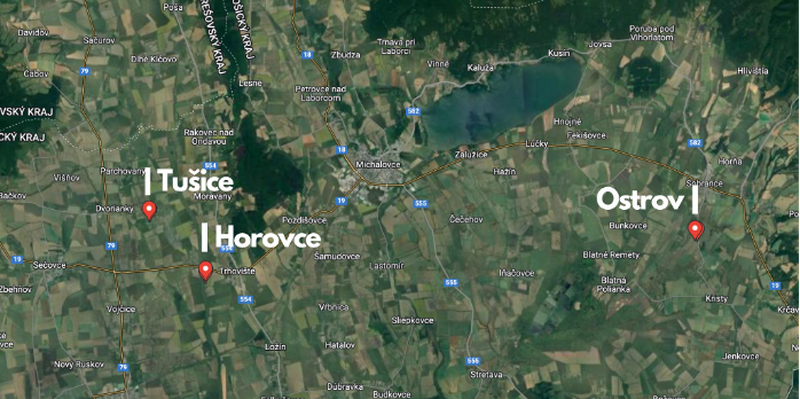
Location of photovoltaic power stations. Source: Investigative Centre of Ján Kuciák
Interestingly, according to available documents, Voyevodin signed a general power of attorney that relegated to others all his power related to the companies behind these electricity stations. Due to anonymization, it is not clear who has power of attorney. The document itself, however, indicates that it was signed in 2015 and is valid for an indefinite period.
Organic fertilizer and strange loans
Photovoltaic power stations are not the only things connecting Mikhail Voyevodin and the three Slovak businessmen. They also have indirect connections to Rokosan, a Sečovce-based company that makes fertilizer from waste feathers. The executive directors of Rokosan are once again the Slovak entrepreneurs Kocák, Szöke, and Vysoký. On its webpage, the company writes that it developed “its own, unique technology that was awarded a patent in the USA in 2013, in the People’s Republic of China in 2015, and in the Russian Federation in 2019, and in Ukraine in 2020.”
Several Slovak ministries consider Rokosan to be a successful company worthy of representing the country. It participated in the annual conference of the Enterprise Europe Network, which was organized by the Ministry of Economy. It also represented Slovakia at Expo Shanghai in 2010 and Expo 2020 in Dubai. In 2020, the state secretary of the Ministry of Foreign Affairs, Ingrid Brocková, after meeting with Rokosan representatives, assured them that “the ministry will continue to support the company’s activities, not only using its own capacities but also the available tools of international organizations.”
In the past, this company has received state subsidies via the Slovak Agency for International Development Cooperation, SlovakAid, for two development cooperation projects––one in Moldavia and one in Ukraine.
Through Rokovia, a related company, it also received nearly 100,000 euros for “the support of the sustainable and just socioeconomic development of the Republic of Rwanda.” State Secretary Brocková once again praised the company for successfully organizing this project, which was supported by her ministry.
The Ministry of Foreign Affairs did not respond to our questions about collaborating with Rokosan even after two weeks. We wanted to know how long the ministry has been in contact with Rokosan and whether it has inspected the financial and personnel situation of this company, whose activities it has been supporting and promoting.
On the outside, Rokosan might seem to be a successful, innovative company, but given its background and ownership structure, several questions arise. In the past, the wife of Alexander Babakov, Irina, was one of the company’s partners. She owned 20 percent of the company from 2009 to early 2014. Similarly, 20 percent was owned by Natalia Selivanova, the wife of Mikhail Voyevodin.
Voyevodin supported his wife’s fertilizer business activities, in which his partners from the photovoltaic power stations were also involved, with a 172,000 euro loan. According to financial statements, Rokosan was also lent money by other companies. For example, it was loaned 400,000 euros by Pensham International Limited, a company registered in the Caribbean tax haven of Saint Kitts and Nevis that is named in the Paradise Papers. It is impossible to find out who is behind this company. This shell corporation lent money to another company associated with Jaroslav Kocák and Róbert Vysoký––VITEX spol. s.r.o. Trebišov––this time to the tune of 1.4 million euros.

A section from Rokosan’s financial statement. Source: registeruz.sk
Dartford Services Limited also lent 3 million euros to Rokosan. In the meantime, the debt was transferred to another shell company, Meraldic Limited. It is not mentioned in any of the large global databases. Some available information, however, suggests that it is linked to Yevgeni Giner or to his family members. According to the CEO of Rokosan, Jaroslav Kocák, Mikhail Voyevodin arranged this financial aid.
Babakov’s Slovak company
It was not just the wife of the former deputy chairman of the Russian State Duma who was active in Slovakia—Babakov was too. Between 2003 and 2007 he was a partner in the company West East Bridge. At the time, the CEO was, according to the commercial register, Róbert Vysoký. Later, he would take over the entire company with Jaroslav Kocák.
In 2005, West East Bridge purchased a run-down property in the city of Košice’s urban heritage reserve located on the corner of Alžbetina and Moyzesova Streets. The building was sold by the city in a public tender. West East Bridge paid 10.5 million crowns for it. In 2008, however, it was allegedly no longer the owner of the property. “We sold it. We had a project drawn up, but in the meantime, there was a change of conditions, which we were unable to meet. We also had financial problems, as well as issues with the renters moving out,” said Róbert Vysoký, the company’s executive director at the time, to the daily Korzár.
Interestingly, like in the cases of Rokosan and VITEX spol. Trebišov, we find in this company’s financial statements a loan, referred to as “short-term financial aid,” provided by another shell company, Constantina Limited. According to the Russian branch of Transparency International, this offshore company was connected to Alexander Babakov and Yevgeni Giner.
A loan for Marine Le Pen’s party
Babakov and Giner were also involved in facilitating a Russian loan for the political party of French presidential candidate Marine Le Pen. According to findings made by Re:Baltica and Mediapart, a major role in this transaction was played by Latvia-based consultant Vilis Dambiņš, who is considered to be the director of the intermediary managing Alexander Babakov’s assets. Dambiņš met in person with at least two high-ranking officials from Le Pen’s National Front party to discuss the possibilities of getting a loan from Russia.
Babakov was allegedly a key figure who helped Le Pen’s party get its first loan from Russia. In June 2016, the party decided to borrow 3 million euros (at a 6 percent annual interest rate) “for financing election campaigns” from the Moscow-based Strategic Bank. But this financial institution lost its license, and the loan was never made. It is not clear what the exact outcomes of the abovementioned meetings were.
The Latvian consultant, however, denies any relationship with Babakov. It turns out, however, that he figures in at least three companies with Russian ties, which used to be headquartered in his office in Riga.
One of the companies headed by Dambiņš, V.D. Nominees Limited, is registered in the Marshall Islands and is connected to two other companies: AED International and NYX Management, which were registered in the British Virgin Islands.
AED International was once owned by Babakov, but he transferred it to his daughter Olga. He owned NYX Management with Yevgeni Giner and Mikhail Voyevodin. The second company managed by Dambiņš, Financiere Egine, was formerly run by Vadim Giner, Yevgeni’s son.
The third company, VS Energy Latvia, owns energy assets in Ukraine. It is assumed to be owned by Babakov and Giner and to be run by Valts Vigants, another Latvian who is Dambiņš’s business partner. The owners of VS Energy Latvia are hidden behind two companies registered in the Seychelles.
But until 2005 Babakov was a member of the board of VS Energy Latvia’s daughter company, VS Energy International, while Giner is known for owning energy assets in Ukraine.
Lucrative assets in the West
A journalist from RFE/RL’s Ukrainian Service and the Scanner project managed to track down assets owned by the mentioned members of the Luzhniki group in France that no one had known about. In the east of France, just a kilometer away from the Swiss border, is a luxurious property: a large estate with a swimming pool and stables on more than 14,000 square meters of land.
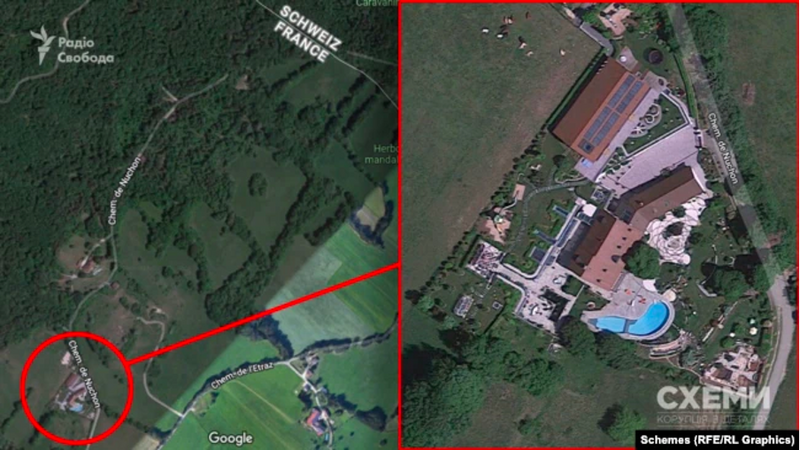
Source: Schemes (RFE/RL)
According to documents, in 2000 they established the French company SCI Ferme de Nuchon, which purchased and operates this property. One percent of this company belongs to the Luxembourg-based Financiere Chiron SA and the remaining 99 percent to Natalia Yuriyivna Selivanova, a Slovak citizen, who according to some documents might also have French citizenship and is the co-owner of Rokosan in eastern Slovakia.
Only 400 meters away from this property, we find another large estate. The documents that the Ukrainian journalist has obtained clearly indicate that this property was bought in the same manner. In 2004, the French company Daria & Co. was founded for this purpose.
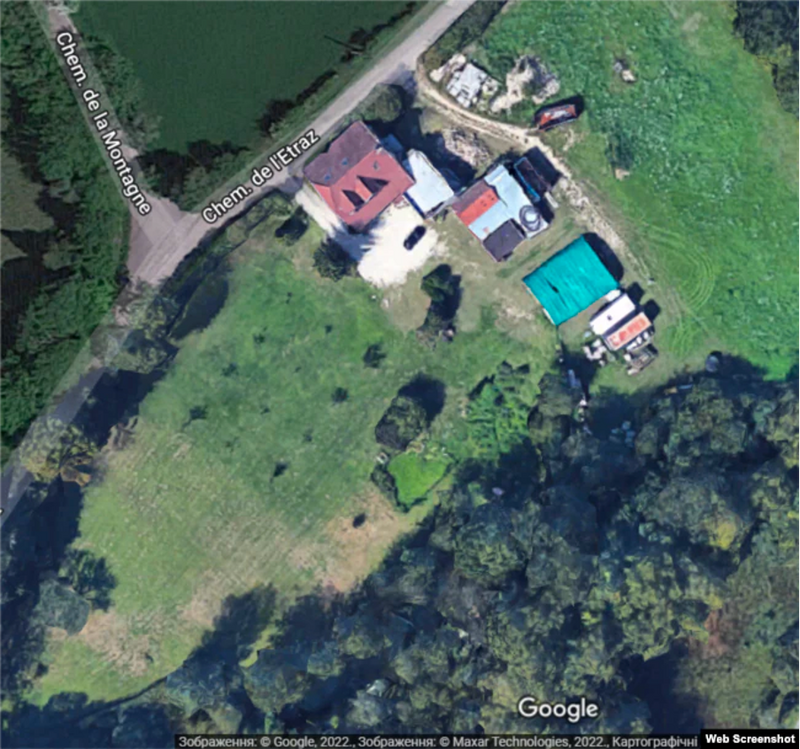
Source: Google Maps
Ninety-nine percent of the company belongs once again to Natalia Selivanova. The remaining 1 percent is owned by British Kilworth Trading Limited. According to the British registrar of companies, Yevgeni Giner, the business partner of Mikhail Voyvodina, is the ultimate beneficial owner.
The journalist also found a third company that was established to purchase real estate. Ninety-nine percent of SCI Du Jardin Alpin is owned by British Harecourt Services Limited. According to the British registrar of companies, its owner is Vadim Giner, Yevgeni’s son.
Natalia Selivanova also owns one percent of this company. The company’s headquarters is located at the address Arcs 1800 73700 Bourg-Saint-Maurice, a ski resort in southeastern France, where the Belambra Clubs L’Hôtel du Golf is located.
Selivanova also owns real estate in Slovakia––a flat on Skladná Street near the center of Košice located in a renovated historic building in the city’s Kulturpark development. According to the title deed, she bought it in 2016.
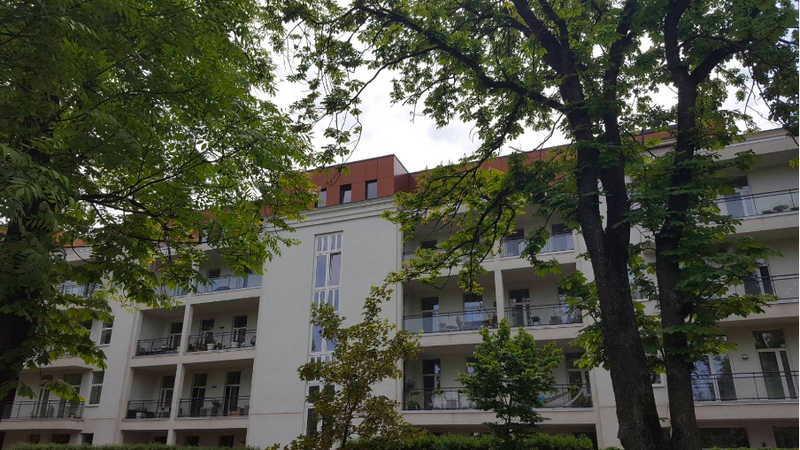
An apartment building on Skladná Street. Source: Investigative Centre of Ján Kuciák
Mikhail Voyevodin also owns a flat at a less lucrative address. Like his wife, he bought this property in 2016. We did not find his name on the doorbell, just the surname “Kocák.”
Whether they actually live in these flats is unknown. According to official documents, it is possible that until at least around 2015 they lived nearby Geneva.
Hidden assets
The assets of people close to Putin could become a source of compensation for the damage caused by the Russian army in Ukraine. There are various legal mechanisms that could make this possible. It would be a long process but would always start with discovering hidden assets.
Tetiana Shevchuk, an expert from the Anti-corruption Action Center in Ukraine, says that currently special EU working groups are searching for assets owned by Russian politicians and Kremlin-linked businesspeople.
“Today, they are already discovering assets owned by sanctioned Russian citizens. Confiscating these assets in the interests of Ukraine requires the adoption of certain decisions at the legislative level, which may take up to one year. The most important thing though is to freeze these assets,” says Shevchuk.
Equally important, she says, is to identify foreign assets that belong to people close to Russian leaders, even if they are not under sanctions.
According to French officials, since the beginning of Russia’s invasion of Ukraine, 22.8 billion euros of foreign assets held by Russian banks have been blocked, and approximately 30 properties, four yachts, six helicopters, and three artworks belonging to sanctioned Russians have been seized.
Andrej Leontiev, a partner in the law firm of Taylor Wessing, notes that we are currently in the first phase of sanctioning Russian oligarchs, in which individual countries must seize their assets. “No one has yet to say, at neither the European Union level nor the UN level, what should be done with those assets once they are seized,” says Leontiev. He also explains that the EU understands that it must develop legislation under which these assets will be forfeited and, when they are forfeited, what each country will do with them. He points out, however, that this is not currently legally possible.
“Based on currently valid legislation, it is very difficult to confiscate assets that belong to Russian oligarchs even if you demonstrate indirect ownership. Whether or not such a person has Slovak citizenship has no influence on this process,” says this legal expert. Leontiev points to a well-established practice in the EU that a sanctioned person must own––whether directly or indirectly––a majority of a given company for the state to be able to touch the said company.
 Support independent investigative journalism in Slovakia,
Support independent investigative journalism in Slovakia,
you can donate here.

